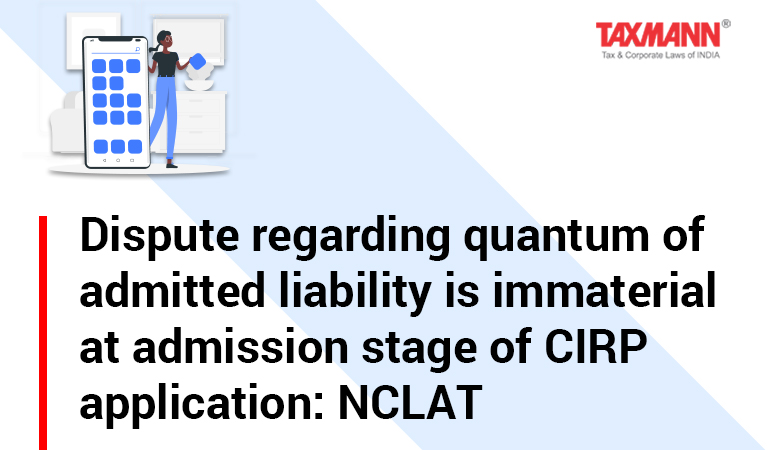Dispute regarding quantum of admitted liability is immaterial at admission stage of CIRP application: NCLAT
- Blog|News|Insolvency and Bankruptcy Code|
- 2 Min Read
- By Taxmann
- |
- Last Updated on 13 September, 2021

Case details: Apya Capital Services (P.) Ltd. v. Guardian Homes (P.) Ltd. - [2021] 129 taxmann.com 393 (NCLAT- New Delhi)
Judiciary and Counsel Details
-
- Justice Bansi Lal Bhat, ACTG. Chairperson Anant Bijay Singh, Judicial Member and DR. Alok Srivastava, Technical Member.
- Abhijeet Sinha, Ms. Bani Dikshit and Farman Ali, Advs. for the Appellant.
- Ms. Priya Hingorani, Sr. Adv. and Himanshu Yadav, Adv. for the Respondent.
- Justice Bansi Lal Bhat, ACTG. Chairperson Anant Bijay Singh, Judicial Member and DR. Alok Srivastava, Technical Member.
Facts of the Case
The Appellant provided its services to the corporate debtor for raising finance to extent of Rs. 280 crores in respect of whereof it raised a proforma invoice for its fees at a rate of 1 percent, i.e., Rs. 2.80 crores.
The Corporate debtor raised the issue of delay in providing service; however, claimed to have amicably decided to conclude the deal at a fee of Rs. 150 lakhs out of which Rs. 75 lakhs had been admittedly paid.
On being aggrieved, the Appellant issued demand notice claiming an amount of Rs. 2.05 crores and further filed Corporate Insolvency Resolution Process (CIRP) application against the corporate debtor.
However, the Adjudicating authority rejected the CIRP application holding that there was no debt as claimed by the appellant besides there being a deficiency in service provided by the appellant.
NCLAT Held
The Adjudicating Authority stated that once liability was admitted and the same was not discharged by the corporate debtor, the dispute in regard to the quantum of debt was immaterial at the stage of admission of CIRP application.
Therefore, the order of Adjudicating Authority was to be set aside and application of the appellant was to be admitted after giving an opportunity to a corporate debtor to settle a claim of the appellant.
Case Review
-
- Apya Capital Services (P.) Ltd. v. Guardian Homes (P.) Ltd. [2021] 129 taxmann.com 392 (NCLT – Mumbai) (para 9) set aside
Disclaimer: The content/information published on the website is only for general information of the user and shall not be construed as legal advice. While the Taxmann has exercised reasonable efforts to ensure the veracity of information/content published, Taxmann shall be under no liability in any manner whatsoever for incorrect information, if any.

Taxmann Publications has a dedicated in-house Research & Editorial Team. This team consists of a team of Chartered Accountants, Company Secretaries, and Lawyers. This team works under the guidance and supervision of editor-in-chief Mr Rakesh Bhargava.
The Research and Editorial Team is responsible for developing reliable and accurate content for the readers. The team follows the six-sigma approach to achieve the benchmark of zero error in its publications and research platforms. The team ensures that the following publication guidelines are thoroughly followed while developing the content:
- The statutory material is obtained only from the authorized and reliable sources
- All the latest developments in the judicial and legislative fields are covered
- Prepare the analytical write-ups on current, controversial, and important issues to help the readers to understand the concept and its implications
- Every content published by Taxmann is complete, accurate and lucid
- All evidence-based statements are supported with proper reference to Section, Circular No., Notification No. or citations
- The golden rules of grammar, style and consistency are thoroughly followed
- Font and size that’s easy to read and remain consistent across all imprint and digital publications are applied



 CA | CS | CMA
CA | CS | CMA
